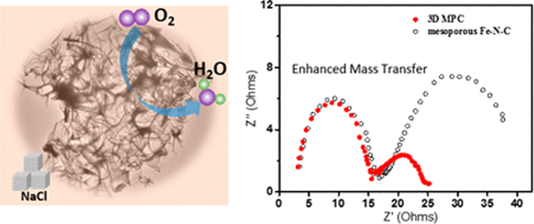Three-dimensional macroporous carbon materials with hierarchical pore structures (3D MPC) have wide applications, but the scale-up synthesis is limited by the cumbersome procedures of template formation and removal. Herein, we show that NaCl crystallites, which form in situ in a lyophilizing process of a NaCl solution containing a carbon precursor and are removable simply through water washing, can act as templates to grow 3D MPC materials with graphene-like ultrathin and mesoporous walls through pyrolitic carbonization. Further, by use of a nitrogen (N)-rich polymer (polyvinylpyrrolidone, PVP) as the carbon precursor and introduction of Fe salt in the precursor, an MPC catalyst with high Fe/ N doping content is achieved due to the NaCl crystallites serving as confining agents to simultaneously prevent the large weight loss and N evaporation, a severe problem in usual pyrolytic syntheses of Fe-N-C catalysts. Benefiting from the mass transport convenience of the macropores as indicated by the impedance spectroscopy results, the Fe/N-doped 3D MPC exhibits high catalytic performance toward the oxygen reduction reaction. The dual functionality, facile formation and removal, and reusability of NaCl make the present method a promising way to gain cost-effective porous Fe-N-C catalysts.
https://doi.org/10.1021/acscatal.7b01695
